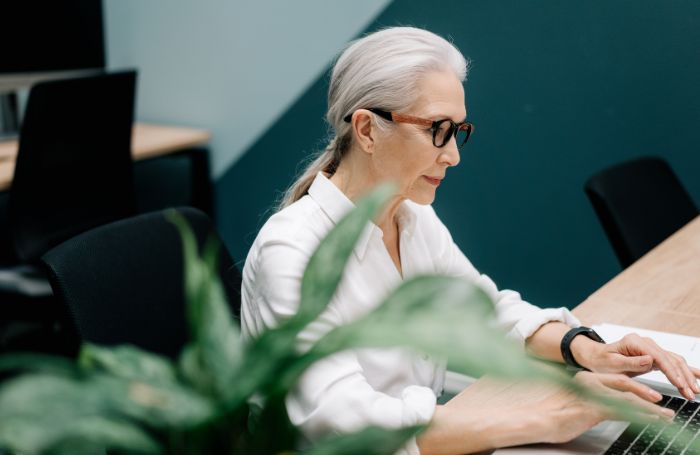The profession’s longstanding debate about how to improve retention rates for women in architecture tends to focus on maternity and the return-to-work process.
But it is estimated that 10% of women leave the profession due to workplace barriers related to menopause, a far less-discussed issue. Indeed, one in four women will consider leaving the workforce as a result.
Ahead of World Menopause Day, which always falls on 18 October, Sharon Davies, Trainer and Consultant at workplace wellbeing training company Altruist Enterprises, says there is a clear need for greater awareness at all levels in the workplace, particularly from line managers.
“Menopause is still an emerging topic, especially for smaller businesses,” Sharon says. “It’s where discussions about mental health in the workplace were five or 10 years ago.”
Some organisations are putting menopause policies in place, and where they have the resources they are making adjustments to women’s working practices. For Sharon, an obvious recommendation is that every practice should make menopause considerations and/or the impact of menopause part, of its wellbeing strategy, regardless of size.
Menopause and its symptoms differ from person to person, and it’s how a workplace and its management acknowledge, support and respond to those experiencing menopause that require the greatest work.
How can practices help with the impact of menopause?
It is important to state that if anyone is experiencing symptoms associated with menopause, they should consult their GP.
Once symptoms have been diagnosed, living and dealing with them at work is a crucial part of the menopause journey. However, there is still an element of stigma attached to the subject, which means that a supportive environment in the workplace is important for those experiencing this natural human transformation.
Listen to more about menopause with the Older and Wiser podcast with Jenny Eclair and Judith Holder.
This is why menopause awareness training is valuable, because there is no set pattern to a person’s experience of menopause - everyone is different and no two people will experience the same symptoms. The severity and duration can also differ widely.
When it comes to what someone might experience, Sharon explains that symptoms can last for as long as 14 years, while menopause usually affects those between the ages of 45 and 55. However, some people notice changes in their 20s or 30s.
There are physical impacts of menopause, which workplaces and line managers can acknowledge and make reasonable adjustments to a person’s work environment based on their individual needs.
Symptoms might include hot flushes, headaches, fatigue or a change in sleep patterns and an increased frequency in urination.
To combat these impacts, Sharon suggests improved in-office ventilation where staff members can create a cooler space for themselves; setting aside quiet, calming spaces that can be used to either work in or relax; re-positioning desks for better toilet access; or avoiding meetings at certain times of the day.
Menopause can also have effects on an individual’s wellbeing such as difficulties with memory or concentration, low self esteem, anxiety and mood changes, all of which could impact a person’s motivation and productivity at work.
These health issues may also require occasional time off or flexibility when it comes to work arrangements. Workplaces could look at their sick leave and absence policies, so individuals do not feel pressured to work through their symptoms.
“Just asking a person what would help them can lead to a reasonable adjustment,” Sharon suggests. “A woman who says she has brain fog in the afternoon and finds it difficult to concentrate, for example, could attend meetings in the morning and stay productive.”

What are the most important things colleagues can do to help those experiencing menopause?
Language: Be aware of the language you are using. Saying "They're having one of those days" isn’t helpful.
Be supportive: Asking questions such as "is everything okay?" and "how are you feeling?" helps normalise menopause and start the conversation.
Recognise that everyone may need different types of support: Ask how you can best help them.
Educate yourself: Gain an awareness and understanding of menopause through training.
Be open: 51% of the population is female and menopause affects everyone. It could be you, your mum, sister or friend.

How do you talk about menopause at work?
Sharon says there needs more tact and detail than a simple, "let’s all talk about the menopause" approach because conversations about personal experiences are likely to be sensitive and for some people very difficult.
And this is where a greater awareness is needed.
Menopause should be part of the general wellbeing conversations that line managers are encouraged to have with team members. If line managers have an awareness of menopause, then when they are carrying out their one-on-ones they can tactfully raise the topic as part of a wider wellbeing check when there are concerns.
“Once you’ve got that relationship with your line manager, discussions will hopefully include how you are feeling, which could then lead on to a conversation around menopause,” she says.
“There should never be direct questioning, because the individual may not wish to talk about it. Rather, you are trying to create a wellbeing environment where that person feels able and comfortable talking about menopause.”
Alternative points of contact could be a practice’s mental health first aider or, if one is in place, a ‘menopause champion’ who has gone through a similar experience herself. Larger organisations may offer menopause support through an employee assistance program.
Sharon says one supportive idea practices can consider is for a menopause champion to host a menopause café, where colleagues can chat about their experiences openly.
She also makes the point that insensitive language among colleagues, particularly managers, can be hurtful to a staff member struggling with the impacts of menopause.
What other resources are available?
Training company Altruist Enterprises provides in-person and online menopause awareness training menopause awareness training for all employees.
They also offer a managers’ course, which goes into more detail about what reasonable adjustments to working practices can be introduced, and how discussions can be encouraged by staging in-house events such as menopause cafés.
Read more with Henpicked, who give women "who weren’t born yesterday" a place to have their say.
Sharon says more best practice advice on menopause policies is appearing, including the free-to-download BS 30416, Menstruation, menstrual health and menopause in the workplace, a comprehensive guide for employers that was published earlier this year.
Meanwhile, RIBA has produced its own guidance to help organisations and managers understand the key facts about menopause and how they can support those around them.
There are two versions: RIBA Menopause Guidance for Colleagues and RIBA Menopause Guidance for Line Managers.
Thanks to Sharon Davies, Trainer and Consultant, Altruist Enterprises.
Text by Neal Morris. This is a Professional Feature edited by the RIBA Practice team. Send us your feedback and ideas.
RIBA Core Curriculum topic: Inclusive environments.
As part of the flexible RIBA CPD programme, professional features count as microlearning. See further information on the updated RIBA CPD core curriculum and on fulfilling your CPD requirements as a RIBA Chartered Member.









